|
|
|
Sort Order |
|
|
|
Items / Page
|
|
|
|
|
|
|
| Srl | Item |
| 1 |
ID:
181668
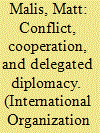

|
|
|
|
|
| Summary/Abstract |
Does diplomacy affect the prospects of international conflict and cooperation? Systematic empirical assessment has been hindered by the inferential challenges of separating diplomacy from the distribution of power and interests that underlies its conduct. This paper addresses the question of diplomacy's efficacy by examining the intragovernmental politics of US foreign policy, and the varying influence of diplomatic personnel in the policy process. I claim that diplomats hold the strongest preferences for cooperative relations with their host countries, relative to other participants in the foreign policy process. They also exert substantial influence over the formation and implementation of US policies toward their host countries but their influence is intermittently weakened by the short-term shock of an ambassadorial turnover. As a result, when ambassadors are removed from post, diplomacy is more likely to be eschewed for more conflictual means of settling international disagreements, and opportunities for economic exchange are less likely to be realized. I test this theory using newly collected data on US diplomatic representation, for the global sample of countries from 1960 through 2014. To address concerns of diplomatic staffing being endogenous to political interests, I leverage a natural experiment arising from the State Department's three-year ambassadorial rotation system. The turnover of a US ambassador causes a decrease in US exports to the country experiencing the turnover, and heightens the risk of onset of a militarized dispute between that country and the US. These findings point to bureaucratic delegation as an important but overlooked determinant of macro-level international outcomes.
|
|
|
|
|
|
|
|
|
|
|
|
|
|
|
|
| 2 |
ID:
095373
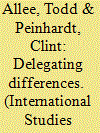

|
|
|
|
|
| Publication |
2010.
|
| Summary/Abstract |
Bilateral investment treaties (BITs) have become the dominant source of rules on foreign direct investment (FDI), yet these treaties vary significantly in at least one important respect: whether they allow investment disputes to be settled through the International Centre for the Settlement of Investment Disputes (ICSID). Through the compilation and careful coding of the text of nearly 1,500 treaties, we identify systematic variation in "legal delegation" to ICSID across BITs and explain this important variation by drawing upon a bargaining framework. Home governments prefer and typically obtain ICSID clauses in their BITs, particularly when internal forces push strongly for such provisions and when they have significantly greater bargaining power than the other signatory. Yet some home governments are less likely to insist upon ICSID clauses if they have historical or military ties with the other government. On the other hand, although host governments are often hostile toward ICSID clauses, particularly when sovereignty costs are high, they are more likely to consent to such clauses when they are heavily constrained by their dependence on the global economy. Our findings have significant implications for those interested in FDI, legalization, international institutions, and interstate bargaining.
|
|
|
|
|
|
|
|
|
|
|
|
|
|
|
|
| 3 |
ID:
197116


|
|
|
|
|
| Summary/Abstract |
The use of autonomy to initiate force, which states may begin to view as necessary to protect against hypersonic attacks and other forms of ‘hyperwar,’ may effectively constitute a delegation of war-initiation decision making to a machine. Yet legal questions about whether and when the leader of a country may delegate their decision making to others – and normative questions about whether he should do so – can be complicated. Any state that intends to introduce significant autonomy into such systems should assess whether and how the use of autonomy in war-initiation comports with its domestic laws and norms that govern the delegation of the use of force.
|
|
|
|
|
|
|
|
|
|
|
|
|
|
|
|
| 4 |
ID:
090991
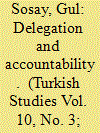

|
|
|
|
|
| Publication |
2009.
|
| Summary/Abstract |
Delegation of authority to independent regulatory agencies (IRAs) creates a breach in chain accountability established in parliamentary democracies and, hence, necessitates designing different mechanisms of accountability that do not undermine the independence of these agencies. After building a framework to assess the accountability of IRAs across countries and sectors, this article analyzes the formal (statutory) and informal (de facto) accountability of six economic sector IRAs in Turkey. The mechanisms of accountability of IRAs to the legislature, executive, and judiciary are more firmly established in the legal framework than to non-state actors. Compliance to formal requirements of accountability is high. However, the accountability deficit generated by delegation is not fully eliminated by introducing and effectively implementing a complex network of accountability mechanisms by which the IRAs can be held accountable not only to the three branches of the government, but also to diverse societal actors and to broadly parallel independent institutions.
|
|
|
|
|
|
|
|
|
|
|
|
|
|
|
|
| 5 |
ID:
082135
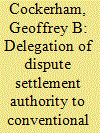

|
|
|
|
|
| Publication |
2008.
|
| Summary/Abstract |
The issue of dispute settlement is problematic in the international system because it may conflict with sovereignty. States may find, however, that in order to facilitate cooperation, they should delegate some authority to resolve disputes to a third party. This article seeks to provide a measure for dispute settlement authority and some explanation for the delegation aspect of international cooperation by examining why states agree to grant dispute settlement authority to a particular kind of institutional arrangement, conventional international governmental organizations (IGOs). The analysis reveals that states tend to enter into IGO agreements with a higher degree of dispute settlement authority when members have a greater incentive to defect due either to the large number of other parties to the agreement, or due to greater cooperative demands as provided by the agreement
|
|
|
|
|
|
|
|
|
|
|
|
|
|
|
|
| 6 |
ID:
193858


|
|
|
|
|
| Summary/Abstract |
What is the effect of delegation to an agreement executor, such as an international organization (IO), on the success of conventional arms control (CAC) agreements in Europe? Arms control agreements have taken different approaches to delegation. The extent of state delegation to treaty executors has ranged from nonexistent to substantial. Previous studies have not looked at delegation as an independent variable of CAC agreement success. This article applies a sum score methodology assessing nine variables in a dataset of nineteen CAC agreements in Europe over the past 100 years. There is a low correlation between delegation and CAC agreement success, though the data suggests that third-party state and IO involvement are the most significant variables related to success. This article proposes that high delegation to an IO with third-party state participation will increase the likelihood that a future CAC agreement between the North Atlantic Treaty Organization and Russia could succeed.
|
|
|
|
|
|
|
|
|
|
|
|
|
|
|
|
| 7 |
ID:
102689
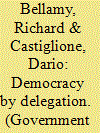

|
|
|
| 8 |
ID:
123009
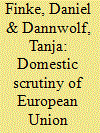

|
|
|
|
|
| Publication |
2013.
|
| Summary/Abstract |
Some European law proposals are subject to scrutiny by national parliaments while others go unchecked. The analysis in this article indicates that the opposition scrutinises European Union law to gather information on the proceedings inside the Council of Ministers and the European Parliament. Yet whereas strong opposition parties scrutinise highly politicised law proposals, weak opposition parties tend to scrutinise those proposals that are negotiated under the non-transparent fast-track procedure. In addition, there is ample evidence that the leading minister initiates scrutiny in order to strengthen his or her intergovernmental bargaining leverage. Yet, this Schelling Conjecture presumes that the party of the minister is located between the expected bargaining position in the Council and the coalition partner. Any other domestic interest constellation could lead to scrutiny motivated by whistle blowing. However, an issue's salience helps us to separate the whistle blowing from the Schelling Conjecture.
|
|
|
|
|
|
|
|
|
|
|
|
|
|
|
|
| 9 |
ID:
183149
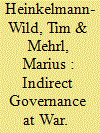

|
|
|
|
|
| Summary/Abstract |
Instead of attacking their adversaries directly, states often do so indirectly by supporting rebel groups. While these support relationships vary considerably, existing research lacks a comprehensive account thereof. To explain states’ choice of support, we suggest differentiating between two modes of support relationships according to the control opportunities they offer states over rebels: while delegation enables “hands-on” control, “hands-off” orchestration allows for plausible deniability and does not harm rebels’ local legitimacy. We argue that sponsors prefer orchestration when “hands-on” control can be substituted by goal alignment or competition; and they prefer delegation when the conflict is highly salient. Tests using global data for the period 1975-2009 support the first two expectations. Surprisingly, states’ capabilities also render “hands-off” orchestration more likely. The paper advances the understanding of external rebel support by transferring insights from indirect governance theory to the study of indirect wars and putting it to statistical test.
|
|
|
|
|
|
|
|
|
|
|
|
|
|
|
|
| 10 |
ID:
154844


|
|
|
|
|
| Summary/Abstract |
The proliferation of regional economic organizations (REOs) is a prominent feature of the contemporary international environment. Many of these organizations aspire to promote regional peace and stability. Some strive to promote these goals only through economic cooperation, while others have expanded their mandate to include mechanisms that address security concerns more directly. A glance at the security components of such organizations indicates that their purpose and design are very diverse. This article sheds light on the sources of this poorly understood phenomenon. Specifically, it argues that organizations that enjoy greater delegated authority are in a better position to expand their mandate into the security realm and to have more far-reaching agreements in this issue area. It then develops a metric that gauges the degree of security cooperation within REOs and presents a new dataset of numerous organizations on this institutional aspect. Employing this dataset in a rigorous statistical analysis and controlling for a host of alternative explanations, it demonstrates that, indeed, REOs with greater delegated authority develop deeper security cooperation.
|
|
|
|
|
|
|
|
|
|
|
|
|
|
|
|
| 11 |
ID:
131489
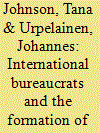

|
|
|
|
|
| Publication |
2014.
|
| Summary/Abstract |
Bureaucrats working in international intergovernmental organizations (IGOs) regularly help states design new IGOs. Sometimes international bureaucrats possess limited discretion in institutional design; sometimes, they enjoy broad discretion. In fact, they gain discretion even when they openly oppose state preferences. This contravenes conventional thinking about delegation: discretion should decrease as preference divergence between states and international bureaucrats increases. We develop a principal-agent theory of how much discretion states grant to international bureaucrats in the design of new IGOs. This is novel: while principal-agent theories of international delegation are common, scholars have not analyzed principal-agent relationships in the creation of new IGOs. We argue that even an international bureaucracy that disagrees with states' design preferences may enjoy substantial design leeway, because of states' need for bureaucratic expertise. In developing this argument, we employ a formal principal-agent model, case studies, and an original data set.
|
|
|
|
|
|
|
|
|
|
|
|
|
|
|
|
| 12 |
ID:
052556
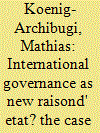

|
|
|
| 13 |
ID:
196074


|
|
|
|
|
| Summary/Abstract |
Career diplomats have expertise. Why, then, do U.S. presidents appoint relative novices to key diplomatic posts? Conventional wisdom points to patronage. Yet this explanation overlooks the benefits of a diplomat’s familiarity with political superiors. Inherent in delegated diplomacy is uncertainty over diplomats' ability to “deliver” on understandings reached at the negotiating table. Non-career diplomats often speak more credibly for political superiors, creating an incentive for foreign counterparts to engage in diplomacy. I theorize a tradeoff between familiarity and expertise to generate empirically testable prediction. Counterintuitively, I expect that presidents often sacrifice professional expertise to delegate important diplomatic assignments to relative amateurs, even accounting for the patronage value of the post. I find empirical support for the argument using a novel dataset on U.S. ambassadorial appointments from the Reagan through Trump administrations.
|
|
|
|
|
|
|
|
|
|
|
|
|
|
|
|
| 14 |
ID:
101094
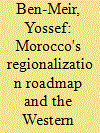

|
|
|
|
|
| Publication |
2010.
|
| Summary/Abstract |
King Mohammed VI of Morocco has announced a national regionalization plan that includes the Western Sahara. Morocco's intention is to regionalize (or, essentially, decentralize) decision-making authority and management in socioeconomic development, political affairs, the judicial system, and other important responsibilities and institutions. The author describes Morocco's roadmap to regionalization, analyzes its principal elements, and presents recommendations for its strategic implementation. Regionalization could potentially establish the necessary conditions to resolve the Western Saharan conflict, but only if it genuinely advances the political, social, economic, and environmental fulfillment of the people living there.
|
|
|
|
|
|
|
|
|
|
|
|
|
|
|
|
| 15 |
ID:
192880


|
|
|
|
|
| Summary/Abstract |
Existing datasets of economic sanctions rely primarily on secondary sources and do not tend to take full advantage of government documents related to economic coercion. Such data may miss sanctions, and do not capture important details in how coercive measures are threatened, imposed and removed. The latter processes often have much to do with the domestic politics in sender countries. Understanding these processes may be necessary in order to fully account for sanctions’ effectiveness. We present a natural language processing (NLP) approach to retrieving sanctions-related government documents. We apply our method to the case of US sanctions. The United States is the world’s pre-eminent user of sanctions. Our method can be applied to other cases. We collect all sanctions events originating in the office of the US president, and all congressional sanctions, for 1988–2016. Our approach has three advantages: (1) by design, it captures all sanctions-related documents; (2) the resulting data are disaggregated by imposing branch of government; (3) the data include the original language of the measures. These features directly shed light on interbranch delegation, domestic (partisan) conflict, and policy priorities. We show that our data record more episodes than most existing sanctions’ data, and have features that other datasets lack. The availability of the original text opens up new avenues for research and analysis.
|
|
|
|
|
|
|
|
|
|
|
|
|
|
|
|
|
|
|
|
|